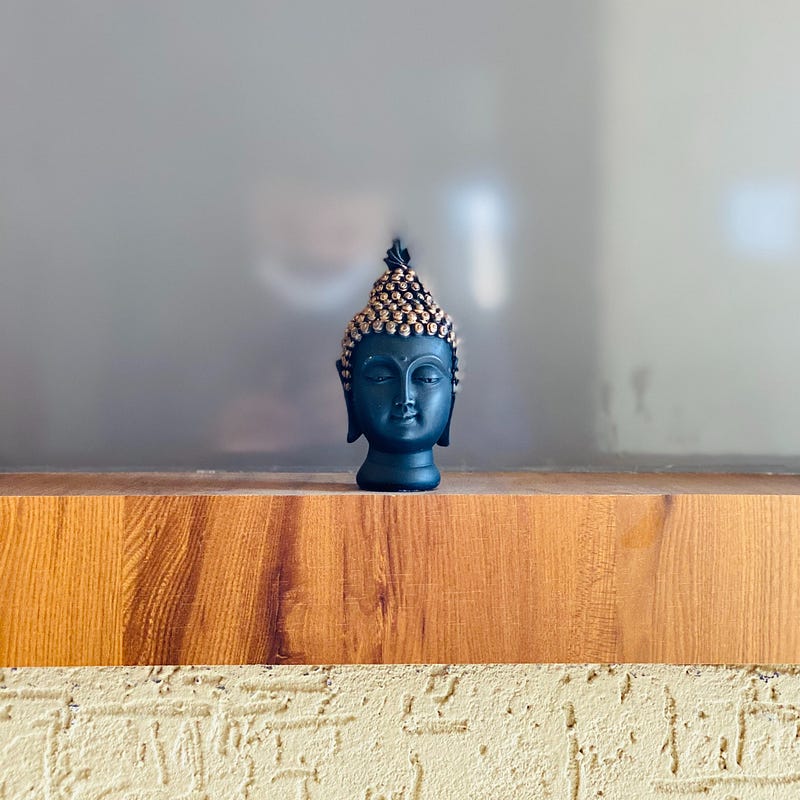Transform Your Communication: 4 Lessons from Buddha
Written on
Chapter 1: Understanding the Mask We Wear
Do you find yourself pretending or remaining silent to shield your true self?

We all battle inner conflicts, and too often, we lack the strength to contain them. These internal struggles can misguide us, leading us to pursue superficial desires. As a result, our communication often falters. The book "Would Buddha Say" by Barbara Ann Kipfer invites us to reflect on how our mental state influences our expressions.
The challenge lies in articulating our thoughts clearly and maintaining effective communication. Miscommunication can have lasting impacts, and without the right strategies, you might find yourself wasting precious years presenting a confusing image to others. If you want to break this cycle, consider these four teachings from Buddhist philosophy that can revolutionize your communication skills.
Section 1.1: Your Voice: An Extension of Yourself
One misstep can overshadow a lifetime of goodwill; a single negative remark can tarnish years of friendship.
Before entering the workforce, I naively assumed I had countless opportunities to make a good impression. However, in face-to-face interactions, you often have just one chance to leave a lasting mark. Many newcomers feel intimidated and either talk too much or fabricate stories.
As Barbara Ann Kipfer wisely states:
"If you are discovered lying, it will be presumed to be a repeated behavior."
Lying is a slippery slope; once you make a false statement, it becomes difficult to retract and admit wrongdoing.
What should you do?
The answer is straightforward: avoid deception.
Though I understand that sometimes you may feel compelled to lie, especially to strangers, try to reserve dishonesty for those rare occasions. Be transparent with those who matter most: friends, family, and colleagues.
Section 1.2: Clarity Over Complexity
Listen closely: Choose your words wisely.
Which phrase resonates more: "Do this" or "Always do this?" The latter may seem more authoritative, but it can actually detract from the message.
Many of us have been conditioned to use adverbs—words like "firstly," "sadly," or "always"—to add weight to our statements. However, these adverbs can dilute your message. As Barbara Ann Kipfer emphasizes:
"Avoid 'should' and definitive terms like 'never' or 'always,' as they can shut down meaningful dialogue."
Adverbs can also act as fillers, demonstrating that you are processing your thoughts mid-conversation. Instead, focus on speaking clearly and succinctly.
What can you do?
Tools like Grammarly can be life-changing. Since the pandemic, my communication has transitioned predominantly online, and Grammarly has been invaluable in refining my messages by eliminating unnecessary words and improving clarity.
You can also adopt these practices:
- Organize your thoughts while the other person speaks.
- If you need time to formulate a response, use phrases like "Okay," or "Tell me more."
These strategies can elevate your communication from ordinary to diplomatic, making your conversations more effective.
Chapter 2: Dealing with Criticism
Imagine this scenario:
You’re in your 40s, managing a modest farm, and potential buyers mock the size of your land compared to neighboring farms.
What should you do? Remain silent and listen? According to Barbara, this isn’t the best approach. You shouldn't have to endure insults passively; instead, assertively respond to criticism.
Barbara Ann Kipfer offers a valuable technique:
"Summarizing what you hear conveys that you’re trying to understand the speaker’s perspective."
Often, critics speak in hushed tones that only you can discern. By summarizing their remarks, you make it clear that you’re affected, and everyone else is aware of the situation.
What should you do?
Utilize this Buddhist technique: summarize what was said and then add your perspective.
For instance, in the farmer scenario, you might say:
"I hear you say my farm is small compared to my neighbor's. But isn’t it curious how we often aspire to own what is beyond our means? I understand your point."
Section 2.1: Embrace Curiosity
Police officers may appear stoic, yet they too have emotions. When they arrive at a scene, their focus shifts to gathering information rather than sharing personal stories.
Barbara Ann Kipfer suggests:
"When engaging in conversation, set aside your agenda. Ask open-ended questions to encourage the other person to share their thoughts."
In many social interactions, we tend to dominate the conversation, often forgetting that meaningful connections are built on mutual sharing. My mother excelled in social settings by employing this simple technique: let others express themselves.
What should you do?
As Zeno of Citium wisely stated:
"We have two ears and one mouth for a reason; we should listen more than we speak."
Listening fosters friendships, while talking excessively can alienate others. If you want to impress someone of higher status, show genuine interest in their experiences. This approach can reveal insights that help you tailor your narrative to resonate with them.
Final Thoughts: The Power of Silence
Can you hold your tongue? If not, this may be the key to forming new friendships. You might be surprised by how many connections can be made by simply listening.
Buddha's profound impact on the world underscores the idea that true influence doesn't require titles or public speaking—sometimes, saying nothing at all can speak volumes.
(I hope these reflections provide you with peace and insight as you ponder them tonight.)
Join 1,260+ writers and find your next writing muse today.
Or consider joining Medium through my referral link.